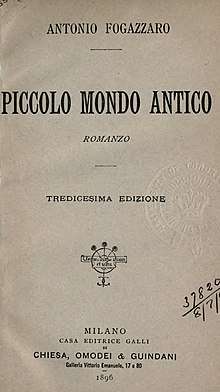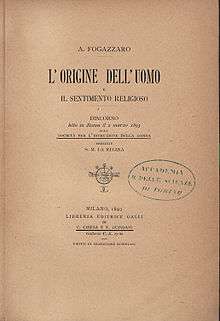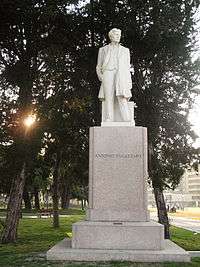Antonio Fogazzaro
Antonio Fogazzaro (Italian pronunciation: [anˈtɔːnjo foɡatˈtsaːro]; 25 March 1842 – 7 March 1911) was an Italian novelist and proponent of Liberal Catholicism.[1][2][3] He was nominated for the Nobel Prize in Literature seven times.[4]
Antonio Fogazzaro | |
|---|---|
 | |
| Born | March 25, 1842 Vicenza |
| Died | March 7, 1911 (aged 68) Vicenza |
| Occupation | Poet, novelist |
| Nationality | Italian |
| Genre | Novel |
| Notable works | The Little World of the Past (1895), The Saint (1905) |
| Signature | |
Biography
Fogazzaro was born in Vicenza to a wealthy family. In 1864 he obtained a law degree in Turin.[5] He then moved to Milan where he followed the scapigliatura movement. In 1869 he was back in Vicenza to work as lawyer, but he left this line of work very soon to be a full-time novelist.
In Fogazzaro's work there is a constant conflict between sense of duty and passions, faith and reason. In some cases this brings the tormented soul of characters into mystic experiences. His most popular novel, Piccolo Mondo Antico (variously titled in English as The Patriot or The Little World of the Past). The novel is set in the 1850s in Valsolda, a small community on the shores of Lake Lugano where he spent most of his life. Piccolo Mondo Antico has delightful evocations of the landscape, and strong characterizations which reveal the inner psychological turmoil of the characters.
Fogazzaro toured Italy proposing to reconcile Darwin's theory of evolution with Christianity.[6] He found new interpretations in positivist and evolutionist theories. The Roman Catholic Church banned the novels Il Santo in 1905 and Leila in 1910. He died in 1911 in his birthplace, Vicenza.
Works



Novels
- Malombra (1881)
- Daniele Cortis (1885)
- Il mstero del poeta (The Mystery of the Poet, 1888)
- Piccolo mondo antico (The Little World of the Past, 1895)
- Piccolo mondo moderno (The Man of the World, 1901)
- The Poet's Mystery: A Novel (1903)
- Il Santo (The Saint, 1905)
- The Woman (1907)
- The Politician (1908)
- Leila (1910)
Other works
- Miranda (1874, verse romance)
- Valsolda (1876, lyrics collection)
- Fedele (1887, short story collection)
- L'origine dell'uomo e il sentimento religioso (1893, speech)
- Discorsi (1898, essays)
- Scienza e dolore (Science and Suffering, 1898, essay)
- Il dolore nell'arte (Suffering in Art, 1901, essay)
- Scene (1903, plays).
- The Trilogy of Rome (1907)
- Tales from the Italian and Spanish (1920)
Notes
- McKenzie, Kenneth (1911). "Antonio Fogazzaro," The Yale Review, Vol. I, New Series, pp. 119–128.
- Sarti, Roland (2009). Italy: A Reference Guide from the Renaissance to the Present. Infobase Publishing. p. 287.
- Helmstadter, Richard J. (1997). Freedom and Religion in the Nineteenth Century. Stanford University Press. p. 210.
- "Nomination Database". www.nobelprize.org. Retrieved 2017-04-18.
- Gallarati-Scotti, Tommaso (1922). The Life of Antonio Fogazzaro. London: Hodder and Stoughton, p. 25.
- Livingston, Arthur (1917). "Antonio Fogazzaro." In: The Warner Library, Vol. 10. New York: Warner Library Co., p. 5852.
Further reading
- Corrigan, Beatrice (1961). "Antonio Fogazzaro and Wilkie Collins," Comparative Literature, Vol. 13, No. 1, pp. 39–51.
- Crawford, Virginia M. (1899). "Antonio Fogazzaro." In: Studies in Foreign Literature. Boston: L.C. Page & Company, pp. 219–247.
- Egerton, Ruth (1911). "Fogazzaro's Last Romance: 'Leila'," The North American Review, Vol. 193, No. 665, pp. 508–514.
- Hall, Robert A. (1965). "Fogazzaro's Maironi Tetralogy," Italica, Vol. 42, No. 2, pp. 248–259.
- Hall, Robert A. (1978). Antonio Fogazzaro. Boston: Twayne Publishers.
- Kennard, Joseph Spencer (1906). "Antonio Fogazzaro." In: Italian Romance Writers. New York: Brentano's, pp. 215–248.
- King, Bolton & Thomas Okey (1913). "Literature." In: Italy Today. New York: Charles Scribner's Sons, pp. 322–352.
- Kuhns, Oscar (1904). "The Nineteenth Century." In: The Great Poets of Italy. Boston and New York: Houghton, Mifflin & Company, pp. 284–342.
- Laphan, L.E. (1906–07). "Fogazzaro and his Trilogy," Part II, Part III, The Catholic World, Vol. 84, pp. 240–250, 381–387, 462–476.
- MacMahon, Anita (1911). "Antonio Fogazzaro: The Man and his Work, 1842–1911," The Catholic World, Vol. 93, pp. 516–527.
- Portier, Lucienne (1937). Antonio Fogazzaro. Paris: Boivin et Cie.
- Reid, Harriet (1906). "Antonio Fogazzaro," The Living Age, Vol. 251, pp. 139–145.
- Rose, William J. (1912). "Antonio Fogazzaro," The University Magazine, Vol. XI, pp. 92–103.
- Rumor, Sebastiano (1896). Antonio Fogazzaro. Milano: Casa Editrice Galli.
- Sharp, William (1912). "Italian Poets of Today." In: Studies and Appreciations. New York: Duffield & Company, pp. 337–393.
- Thayer, William Roscoe (1908). "Fogazzaro and his Masterpiece." In: Italica: Studies in Italian Life and Letters. Boston and New York: Houghton, Mifflin & Company, pp. 1–27.
External links
| Wikisource has original works written by or about: Antonio Fogazzaro |
| Wikimedia Commons has media related to Antonio Fogazzaro. |
- Works by Antonio Fogazzaro at Project Gutenberg
- Works by or about Antonio Fogazzaro at Internet Archive
- Works by Antonio Fogazzaro, at Hathi Trust
- Works by Antonio Fogazzaro: text with concordances and frequency list
- Concordances and Frequency Lists of "Malombra"